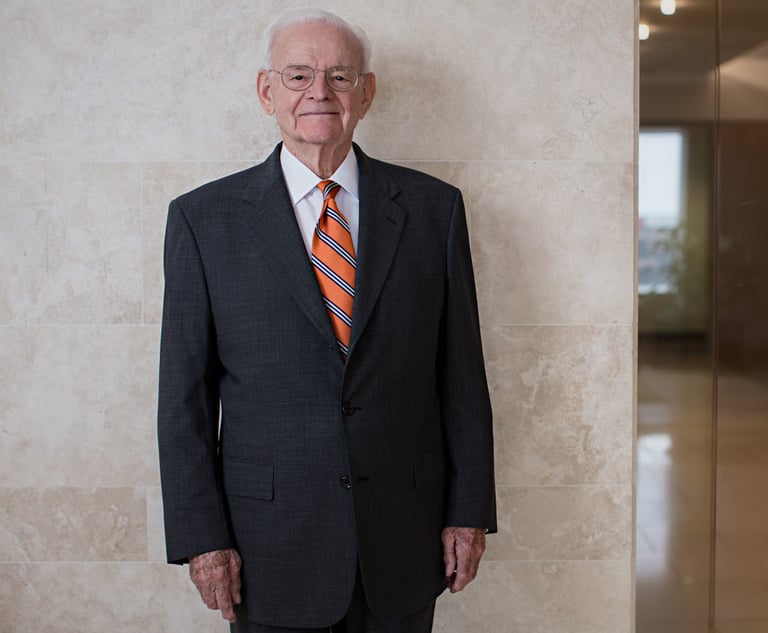Why Some Parents Become Advocates After the Death of Their Child
As a personal injury attorney for more than 30 years, I have often represented clients whose lives were devastated by terrible injuries: brain and spinal injury, severe burns, amputations and paralysis.
July 10, 2015 at 07:39 AM
8 minute read
“While there is nothing good in trauma, good can come out of trauma,” Viktor Frankl wrote in “Man's Search for Meaning.”
As a personal injury attorney for more than 30 years, I have often represented clients whose lives were devastated by terrible injuries: brain and spinal injury, severe burns, amputations and paralysis. Even worse, many of my clients' loved ones have been killed. Those cases always proved challenging for me to grasp the enormity of my client's damages, so that I could properly convey their loss to adjusters, risk managers, defense counsel, judges and jurors. But, no challenge was greater for me than representing parents who had lost a child. During these cases, I would sometimes try to imagine what it would be like for one of my two children to die. But I couldn't spend much time thinking about that because it was too painful to comprehend. We know, of course, that tragedies do happen. That children do die. But we just never expect it to be our children. I never imagined that my daughter, Casey, would be taken from me. She was struck and killed by a distracted driver in 2009.
Since Casey's death, I have learned that trauma, including grief and loss, can present the opportunity for growth. Psychologists refer to positive psychological change following trauma as post-traumatic growth (PTG). Perhaps the two leading authorities on PTG are researchers from the University of North Carolina, Richard Tedeschi and Lawrence Calhoun. Tedeschi and Calhoun define PTG as “the experience of significant positive psychological change arising from the struggle with highly challenging life circumstances.” Thus, PTG describes an experience in which an individual, following trauma, and even suffering from post-traumatic stress disorder (PTSD), not only returns to baseline functioning, but exceeds prior levels of functioning in some areas. It is not the trauma itself that causes PTG, but rather the individualized reaction: our personal struggle with trying to adapt to the loss that causes growth. Additionally, it is not that the symptoms of PTSD have disappeared, but that personality changes indicative of growth co-exist with PTSD.
NOT FOR REPRINT
© 2025 ALM Global, LLC, All Rights Reserved. Request academic re-use from www.copyright.com. All other uses, submit a request to [email protected]. For more information visit Asset & Logo Licensing.
You Might Like
View All
'Taking the Best' of Both Firms, Ballard Spahr and Lane Powell Officially Merge
6 minute read
Judge Louis C. Bechtle: An American Jurist Who Relied on Common Sense, Sound Judgment and Fairness
5 minute read
Trending Stories
Who Got The Work
Michael G. Bongiorno, Andrew Scott Dulberg and Elizabeth E. Driscoll from Wilmer Cutler Pickering Hale and Dorr have stepped in to represent Symbotic Inc., an A.I.-enabled technology platform that focuses on increasing supply chain efficiency, and other defendants in a pending shareholder derivative lawsuit. The case, filed Oct. 2 in Massachusetts District Court by the Brown Law Firm on behalf of Stephen Austen, accuses certain officers and directors of misleading investors in regard to Symbotic's potential for margin growth by failing to disclose that the company was not equipped to timely deploy its systems or manage expenses through project delays. The case, assigned to U.S. District Judge Nathaniel M. Gorton, is 1:24-cv-12522, Austen v. Cohen et al.
Who Got The Work
Edmund Polubinski and Marie Killmond of Davis Polk & Wardwell have entered appearances for data platform software development company MongoDB and other defendants in a pending shareholder derivative lawsuit. The action, filed Oct. 7 in New York Southern District Court by the Brown Law Firm, accuses the company's directors and/or officers of falsely expressing confidence in the company’s restructuring of its sales incentive plan and downplaying the severity of decreases in its upfront commitments. The case is 1:24-cv-07594, Roy v. Ittycheria et al.
Who Got The Work
Amy O. Bruchs and Kurt F. Ellison of Michael Best & Friedrich have entered appearances for Epic Systems Corp. in a pending employment discrimination lawsuit. The suit was filed Sept. 7 in Wisconsin Western District Court by Levine Eisberner LLC and Siri & Glimstad on behalf of a project manager who claims that he was wrongfully terminated after applying for a religious exemption to the defendant's COVID-19 vaccine mandate. The case, assigned to U.S. Magistrate Judge Anita Marie Boor, is 3:24-cv-00630, Secker, Nathan v. Epic Systems Corporation.
Who Got The Work
David X. Sullivan, Thomas J. Finn and Gregory A. Hall from McCarter & English have entered appearances for Sunrun Installation Services in a pending civil rights lawsuit. The complaint was filed Sept. 4 in Connecticut District Court by attorney Robert M. Berke on behalf of former employee George Edward Steins, who was arrested and charged with employing an unregistered home improvement salesperson. The complaint alleges that had Sunrun informed the Connecticut Department of Consumer Protection that the plaintiff's employment had ended in 2017 and that he no longer held Sunrun's home improvement contractor license, he would not have been hit with charges, which were dismissed in May 2024. The case, assigned to U.S. District Judge Jeffrey A. Meyer, is 3:24-cv-01423, Steins v. Sunrun, Inc. et al.
Who Got The Work
Greenberg Traurig shareholder Joshua L. Raskin has entered an appearance for boohoo.com UK Ltd. in a pending patent infringement lawsuit. The suit, filed Sept. 3 in Texas Eastern District Court by Rozier Hardt McDonough on behalf of Alto Dynamics, asserts five patents related to an online shopping platform. The case, assigned to U.S. District Judge Rodney Gilstrap, is 2:24-cv-00719, Alto Dynamics, LLC v. boohoo.com UK Limited.
Featured Firms
Law Offices of Gary Martin Hays & Associates, P.C.
(470) 294-1674
Law Offices of Mark E. Salomone
(857) 444-6468
Smith & Hassler
(713) 739-1250






